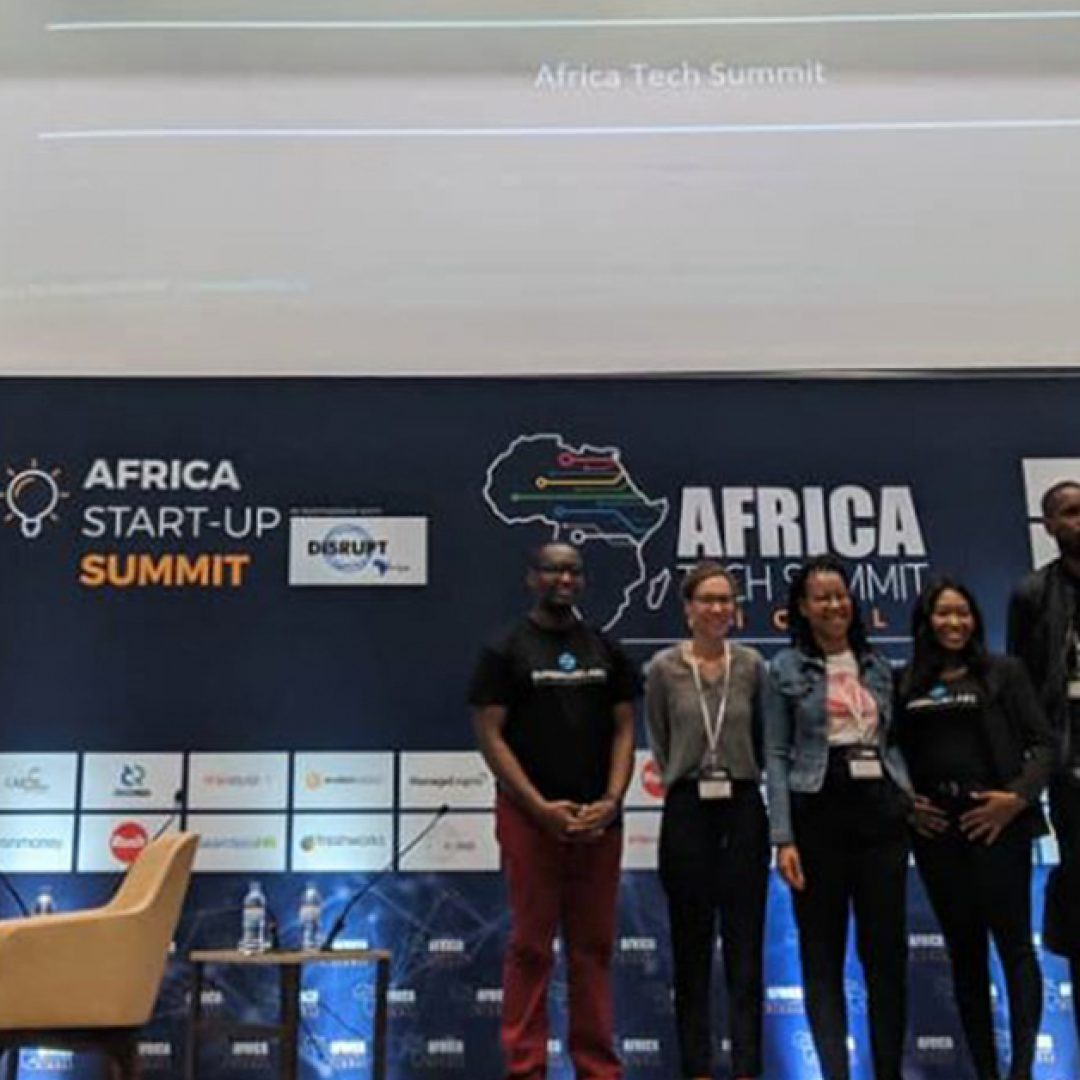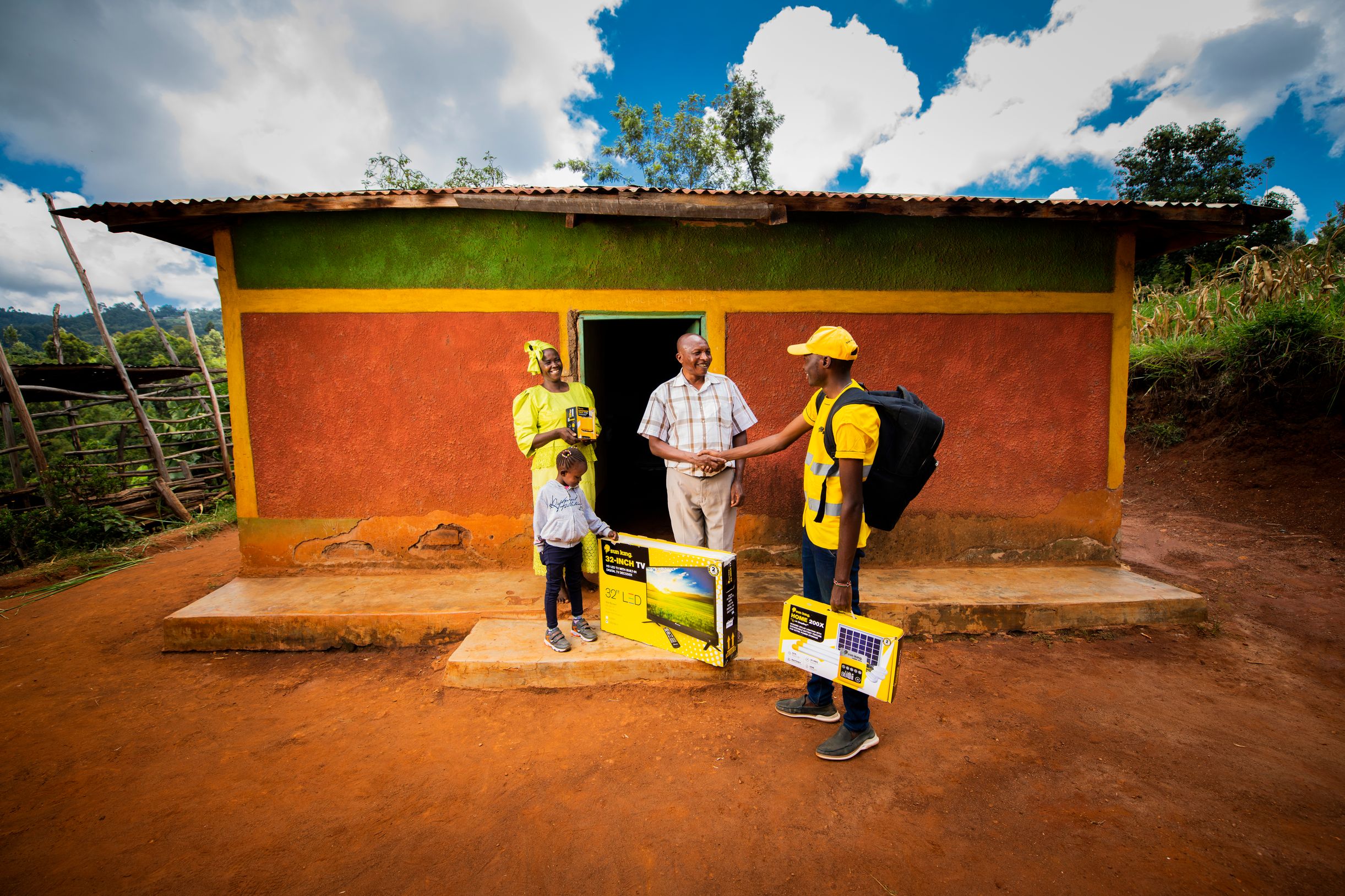Winifred and Timothy Kotin are Tag Team Siblings who are pioneering an African data analytics firm with a mission to empower businesses with the needed intelligence to better serve their customers and create value.
In this insightful interview, the co-founders discuss their humble beginnings, accomplishments, entrepreneurial journey, challenges, and advice to other entrepreneurs.
Can you please introduce yourselves?
Winifred: My name is Winifred Kotin and I have a background in technology and banking. I have an MBA in finance and the first degree in computer science. I worked in technology within the banking industry for two banks GTbank and Access Bank, both in Ghana where I occupied multiple roles which included working on software engineering, building applications to run workflow processes, and customer engagements. Furthermore, I have also done some work around payments, Visa, MasterCard, and Mobile money after which I went on to do some work in digital banking and business development. I am looking forward to what we can do to expand economic opportunities using data and Artificial Intelligence (AI).
Timothy: I am Timothy Kotin, Winifred’s brother, and business partner at Superfluid Labs. I have a background in computer science and electrical engineering from Harvard, I also have a Master of Philosophy (MPhil) in engineering for sustainable development from Cambridge. My professional experience is the intersection of technology innovation and international development. I have worked as an international development consultant in the US and in East Africa for multiple foundations and organizations, like the Bill & Melinda Gates Foundation, UN Foundation, and the US Government. During the second phase of my professional career, I also worked as a data scientist with IBM Research where my team worked with several large financial institutions to develop innovations around digital financial services. The third phase of my career is co-founding Superfluid Labs with Winifred where our mission is to expand economic opportunities, using data and AI.
Why did you both decide to do this together?
Timothy: That’s a very interesting question. Winifred and I are both problem solvers at heart, but all our family largely is. Personally, my professional work as a consultant and data scientist has been defined by helping organizations across the private sector and public sector better solve problems to deliver impact. Winifred was doing the same thing in her career as well and coincidentally, at some point, we independently realized there was an opportunity to leverage technology to deliver greater impact at scale. Given the shared values, it just seemed like the ideal thing to do was to team up and leverage each other’s expertise in similar and relevant domains to pursue this opportunity.
What is the story behind Superfluid Labs?
Timothy: While I was at IBM Research, there was a project I was involved in that was extremely inspiring. This was with a commercial bank that was initially mostly serving high-net-worth individuals and corporate clients in Kenya and had around 50,000 customers. This bank had an ambition and a desire to expand its services to reach millions of financially excluded consumers in Kenya. However, there was a problem. The problem was that the bank didn’t see it being economically viable to open multiple branches in every corner of the country and do things the old way. This bank turned to mobile phones, which were very prevalent, at least in the country. They had a desire to leverage mobile phones to deliver savings accounts and credit accounts. In summary, I got the opportunity to support the bank to build the credit scoring models that enabled this product to be scaled. And today, the bank is probably in conjunction with Safaricom, running the largest and perhaps most widely used digital banking offering in Africa, which is reaching over 50 million consumers on feature phones using USSD and basic SMS. And that product is called M-Shwari.
This inspiring experience was a part of the motivation for Superfluid Labs. I thought, wow, this one institution could unlock so much economic opportunity for millions of consumers using data and AI. What more would be possible if 1000s or millions of other regular everyday businesses across Africa could also be empowered to use the same powerful technology to deliver other services across healthcare, energy, commerce, agriculture, etc, and in so doing build successful businesses for themselves and impact hundreds of millions of consumers across Africa. So, the motivation for Superfluid was to build a company that would enable businesses to expand economic opportunities to reach new markets and new customers.
How did you come across the name Superfluid Labs?
Timothy: The name has three components. Super, Fluid, and Labs.
The first component is Super. We believe that data and AI are modern superpowers, and we want to provide this superpower to everyday businesses to enable them to become heroes for their customers.
The second component is Fluid. This has to do with the fact that we want to enable seamless and delightful customer experiences that are enabled by technology.
The last component is Labs. This is because we wanted to continuously have a culture of innovation.
What is the motivation behind running a start-up?
Winifred: Data and AI are very powerful, and they provide a lot of capabilities. We like to think of it as energy because it provides energy to power a lot of things, as data is harnessed. And then analytics and artificial intelligence is being used to refine and enable several valuable outcomes. For us, one of the biggest motivations for running this is that the field of data and AI is still relatively new. So, if we wanted to be a part of using the superpower to scale, expand opportunities and create a lot more possibilities, it wouldn’t have been easier to find the right environment than to create it. The reason why we have this startup is that we identify the power of AI and data, and we believe in its enormous capabilities. And the best way to take advantage of that and deliver possibilities within that field is to create a business around it. As technologists and innovative people at heart, we know that one of the best ways to solve the problems around us and support businesses is around the area of understanding customers’ needs, and retaining them. We identify data and AI as one of the best tools and capabilities to be used for solving these challenges. So, creating a startup and building capabilities and solutions to address these challenges was very gratifying for us.
How has the journey been so far?
Timothy: It’s been an entrepreneurial roller coaster. I think almost every entrepreneur would mention the fact that you have highs and lows which can sometimes be multiple times within the same day.
However, the overall highlights of our journey have been the fact that we have successfully worked with multiple businesses in over 10 African countries. We are extremely inspired by the impact that those businesses are delivering, for example, one of our customers is almost a million households across Africa to access reliable electricity using our credit scoring technology. We also have retail businesses that are serving informal markets in West Africa and East Africa, Kenya, and Nigeria to be precise, and they are also empowering millions of small merchants and digitizing the informal economies across the continent.
Another major moment was when we got recognized by the London Stock Exchange group as part of the Companies to Inspire Africa in 2019 which was both very humbling and exciting for us.
So, the highlight every day is knowing that our work translates into impact. We are empowering businesses that are really helping everyday individuals and small businesses.
The lowlights, one of the biggest ones that I recall is that one of our early customers, a large bank in East Africa went out of business. There was a financial sector cleanup in Kenya and the bank going out of business, was unfortunate timing for us because we had a contract with the bank that delivered a solution that the bank was supposed to go live with. At the time, the bank was one of the most innovative banks in Kenya in terms of delivering new services with a digital banking product they wanted to roll out. For us, that was a massive blow as we lost multiple early team members, lost revenue that we would have gotten from that contract, and expenses that were not paid to date. But fortunately, we survived, and we have thrived since then. One of my favorite statements about entrepreneurship is that ‘’businesses fail when the entrepreneurs give up’’.
Regardless of the setback, Winifred and I still believed in the mission and importance of what we wanted to do, we still believed in the opportunity that could be unlocked and so, we found a way to ride with the tide and continue to deliver impact to dozens of businesses since then.
Winifred: Another recent high moment for us was when we were awarded the Best Data Analytics and Credit Scoring Startup in Africa at the Africa Tech Summit. Out of 150 businesses that participated in the event, we were part of the five top shortlisted and at the end of the day, we won! That gave us a big opportunity to work on a huge project for a multinational customer. And so we are really excited for Superfluid to be recognized as one of the best in the industry.
What are the challenges you faced in the earlier stages?
Timothy: At every stage of a business, you have different challenges, and those challenges also present themselves as opportunities. One of the early challenges that we faced as a B2B business was that for our first customers, the question was, this is a great solution that you’re proposing? Who else has tried this solution before? Do you have a portfolio of customers already using this? And for someone just starting out, you don’t have any prior customers and that can be extremely challenging.
Fortunately, through a combination of persistence, conducting pilots with some customers, and successfully delivering value to the few initial customers that trusted us, we were able to establish that track record. Today, that is not as much of a problem anymore. We are able to point to many examples of businesses that we’ve worked with, but in the early days, that was a big challenge.
Looking back at the journey, what mistakes could you have avoided?
Winifred: One of the things we would have done differently would have been to be even more data-driven ourselves. To subject a lot of our assumptions and understanding to a lot of testing, collect data, and based on the insights from the data, continuously transition to get to the kind of results we wanted and see more progress.
Who are the people who have been instrumental to your growth?
Winifred: There are several people we can mention, but I doubt we’ll be able to exhaust the list. For starters, we would want to acknowledge our team as they have been very supportive even with the challenges of working in a start-up. They have been flexible to the growing needs of the business, especially those who have worked with us in various and diverse ways.
Over the years, there have also been multiple partners that came in to support us when we were still early on without the kind of opportunities we have now or the market which hadn’t really been created, as it is now post-COVID for using data and AI to achieve business.
We really appreciate all those people who came through, investors, advisors, the past angels, and those who still support us like the Diaspora Angel Network.
Timothy: To add to that list, I’d like to appreciate our customers for believing in us. It’s not easy for a business to trust a startup with a limited track record to solve their problems and allow us to support them with one of their most valuable assets: their data. Because data is something that is very sensitive to a lot of organizations, they must be a proper custodian of that on behalf of their customers. So, the level of trust that our customers give us and for us to have the opportunity to retain their faith by delivering results that they expect for them. We are grateful.
What is the goal for Superfluid Labs?
Timothy: Our goal is to impact and expand opportunities for at least a hundred million consumers every year within the next five years.
What would you say is the value that Superfluid Labs brings to the table?
Timothy: The value Superfluid Labs bring to the table is two-fold. Every business succeeds by finding, attracting, converting customers, and retaining those customers profitably. The value superfluid brings is that we help businesses to more effectively attract the right kinds of customers that they want. When you already have a set of customers that you’ve spent a lot of marketing and financial effort to acquire, we help the businesses also retain them. Research has shown that it can cost up to five times as much to acquire a new customer as it costs to retain and keep an existing customer happy. So, this is a massive economic value that we are providing to businesses by allowing them to know their customers, what they are like, their satisfactions and reservations, and to proactively engage with them so that they can retain them.
A lot of consumers globally, but with Africa as our initial market, do not have access to essential services, whether it is access to credit, access to retail, healthcare, communication, or energy because businesses are relying on an outdated definition of trust. And so, Superfluid’s technology allows each of these individuals to use their interactions with other everyday businesses, their purchase habits, sales patterns, and who they’re buying from, to prove that they are trustworthy. This means that other businesses can take a chance with them and offer them certain services, which is not currently the case in many markets. The absence of trust slows down economic opportunities for individuals, slows down growth and sales opportunities for businesses, and overall limits the size of the economy in these markets.
In summary, what Superfluid Labs does is, we are accelerating and expanding commerce and the overall economy by enabling more trust between businesses and consumers.
What are the milestones you are looking to achieve in 2022?
Timothy: For 2022, we are looking to triple our revenue from the previous year. Fortunately, we are very happy that in the last 18 months we’ve really found product-market fit and the right business model through which we believe that we can scale. So, next year we are looking to really accelerate the growth of our business through partnerships with large B2B customers that are reaching hundreds of thousands of consumers. We already have contracts with several of these from 2021 and through our current pipeline, we are looking to triple that.
In addition, we are also keen to expand. Our solutions are impacting consumers in over 10 African countries, but there are over 54 countries in Africa with many businesses and many markets beyond Africa that interact with Africa as well. So, we are looking to continuously grow the geographies and regions with our solutions touching and serving consumers.
How would you rate the start-up ecosystem in Africa?
Winifred: There has been significant growth in the startup ecosystem in Africa, and most notably there is now a lot more investment and funding into startups. Also, the startups in Africa understand the market, the challenges, the different economies, and how value can be created within these economies. So, it’s actually a very exciting time for African startups and for a lot of experts and professionals who have chosen to work within Africa and to build and create solutions for the economies and for profit. I am very excited, and we know it’s only going to get better.
What would people be surprised to know about you?
Timothy: One of the things that I really enjoy is art and design. As a kid, I always loved drawing. Unfortunately, I don’t do that enough now, but the way I get to do that is by creating Data Visualizations, PowerPoints, etc. I also enjoy beautiful things, whether in nature or works of art that other people have produced.
Winifred: Funny enough, I also love arts and design. Growing up as a child in basic school, we used to draw only once a week. On the timetable, it was only on Fridays and that made me sad because I wish we had drawn as frequently as we had Mathematics or English. However, one productive way I’ve used the art aspect of my life is to create many of the marketing designs and assets for Superfluid Labs.
When you’re not running Superfluid Labs, what else are you doing?
Winifred: I’m mostly watching movies, spending time with my family, and learning. I learn a lot more now than even when I was still a formal student.
Timothy: I enjoy teaching as well as mentorship. So, every now and then I take on opportunities to speak with other people who are earlier on in their careers, or those interested in pursuing either academic studies or professional studies in science or technology.
What piece of advice would you give your younger self?
Winifred: It would be to explore and implement a lot of my dreams early on and be bolder.
Timothy: There are so many things I wish I could go back in time and tell my younger self. If I must pick just one, I will say time deals with many things, and that means being patient for certain outcomes that you want because they will eventually happen. In a business context, I’d say finding out the right time for ideas and concepts. You may have the ideas, and a great product, but if the timing is not right and it’s not in sync with what the market needs at that point, then that could be a problem. So just valuing and thinking about time, is something that I wish I could transmit to my younger self.
What tips would you give to other start-ups?
Timothy: There’s a book that I read recently, which was recommended to me by a friend called the ‘’The Right It: Why So Many Ideas Fail and How to Make Sure Yours Succeed’’ which is probably one of the best business books that I’ve read in a while. The primary point of the book is that a lot of businesses and entrepreneurs often focus a lot on doing things right. Whereas the real question is, are you doing the right “it” in the first place? And so, this book shares a lot of tips, tools, and frameworks for validating ideas early on. One of the recommendations for a lot of startups is before you obsess and worry too much about doing things right, having the right processes matters. Try and validate as early as possible whether what you’re doing is the right thing.
Winifred: I would say to learn from others, spend a lot of time, effort, and resources learning from others. For instance, the book shared by Timothy is an example of the way you can learn from others because people have been there. Some have made mistakes and have been very kind to document and share with you. So, find those people and learn from them.








